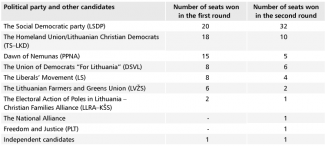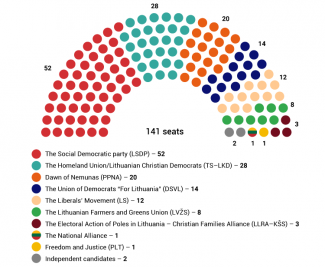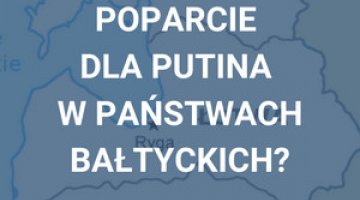A change of government in Lithuania: the Social Democrats assume power from the centre-right
On 27 October, in the second round of the Lithuanian parliamentary election, the opposition Social Democratic party (LSDP), led by Vilija Blinkevičiūtė, emerged victorious. The election was held in 63 single-member districts, with two candidates competing in each district after achieving the best results in the first round in each district. Voter turnout was 41.04%.
The LSDP will hold 52 seats in the 141-seat parliament, including 34 seats won in single-member districts (see Appendix 1). The conservative Homeland Union/Lithuanian Christian Democrats (TS-LKD), which governed for the past four years and is the primary political rival of the Social Democrats, ultimately won 28 seats. The populist Dawn of Nemunas party (PPNA) came third with 20 seats, while the Union of Democrats “For Lithuania” (DSVL), previously an opposition party, placed fourth with 14 MPs.
The LSDP’s landslide victory ensures that it will lead the new governing coalition, which it will need to form with at least two other parties. It intends to initiate coalition talks first with the DSVL and the Lithuanian Farmers and Greens Union (LVŽS).
Commentary
- The Social Democrats owe their victory to voter mobilisation against the ruling conservatives in the second round of the election. Conservative candidates were defeated even in Kaunas, several constituencies in Vilnius, and multiple smaller towns, where they usually achieve their best results. The leader of the conservatives, Foreign Minister Gabrielius Landsbergis, suffered a significant defeat as he was not elected in a single-member district in Kaunas. Consequently, he announced his intention to pause his political career and step down as the Conservative party leader. The outgoing Prime Minister Ingrida Šimonytė may succeed him as the head of the TS–LKD’s, as she secured a seat in the first round of the election in a single-member district. Currently, she is the most popular right-wing politician and member of the opposition in the new Seimas. The Freedom Party emerged as the biggest loser in the recent election. Although it had co-formed the ruling centre-right coalition for the past four years, it failed to surpass the 5% electoral threshold and did not win a single seat in any single-member district.
- An alliance between the Social Democrats, the Democrats led by former Prime Minister Saulius Skvernelis, and the LVŽS led by Ramūnas Karbauskis is the most probable new coalition line-up. Talks are ongoing regarding the formation of this coalition. Should Skvernelis and Karbauskis manage to overcome their mutual distrust, the new centre-left coalition will hold a majority of 74 seats. Three seats won by the Electoral Action of Poles in Lithuania – Christian Families Alliance (LLRA–KŠS; AWPL–ZCHR [Polish]) could further consolidate this stability. This party, representing the Polish minority, was previously a member of the coalition formed by the Social Democrats and the Farmers from 2019 to 2020. Alternatively, the Social Democrats may attempt to form a different coalition where the liberals would replace the farmers. Although such a coalition would hold a majority of up to 78 seats, it would likely face greater challenges in implementing a left-wing economic agenda. The Social Democrats are not considering the third most successful party, the Dawn of Nemunas, as a potential coalition partner, and the party’s leader, Remigijus Žemaitaitis, has announced his intention to remain in the opposition.
- Although the Social Democrats have received a strong mandate, it remains uncertain whether Blinkevičiūtė (see Appendix 2) will resign as an MEP and agree to become Lithuania’s new prime minister. After the election, she announced that, in cooperation with President Gitanas Nausėda, she would work towards forming a coalition. However, she did not openly confirm whether she would accept the role of prime minister. Her potential withdrawal after the coalition is formed may provoke criticism from voters. The Social Democrats do not have a politician within their ranks who could replace Blinkevičiūtė as prime minister without causing considerable damage to the party’s reputation. Gintautas Paluckas could be a possible candidate; however, as party leader from 2017 to 2021, he was unsuccessful in restoring the Social Democrats’ former prominence (he is currently deputy leader). The current party leader has remained one of Lithuania’s most popular politicians for many years.
Appendix 1
Table. Number of seats won by individual parties in the first and second rounds of the parliamentary elections in Lithuania

Chart. Division of seats in the new Seimas of the Republic of Lithuania

Source: the author’s own analysis based on election results published by vrk.lt.
Appendix 2. Profile of the Social Democratic party’s leader
Vilija Blinkevičiūtė (b. 1960) started her political career in the 1990s, holding several positions in the Ministry of Social Affairs under successive governments, and from 2000 to 2008, she served as Minister of Labour and Social Policy. She focused on supporting the poorest groups of citizens, even at the expense of budgetary discipline. She has been an MEP since 2009 and is a member of the Progressive Alliance of Socialists and Democrats group. Currently, she lends credibility to a social welfare-oriented left-wing agenda, including reform of the education and health care sectors, and improving Lithuanian families’ financial standing. She advocates for halting electricity price increases and combating poverty. Her professional interests also encompass issues related to women’s empowerment and support for socially excluded individuals. She favours Lithuania’s close integration within EU structures and supports state activities aimed at strengthening NATO’s collective defence. Following the elections, she intends to continue her efforts to support infrastructural development essential for Lithuania to host a German brigade and establish a national division within the Lithuanian army, and maintain her commitment to supporting Ukraine. In 2021, as an MEP, she successfully restored the Social Democrats’ popularity following a prolonged leadership crisis within the party.




